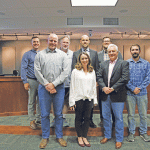Winter is coming
The winter solstice marks the first day of winter. For people residing in the Northern Hemisphere, Tuesday, December 21, 2021, heralds the official arrival of winter (the Southern Hemisphere’s winter solstice is on Sunday, June 20). This is also a turning point in the year when thankfully, the days start getting longer. At the Winter Solstice, the sun travels the shortest path through the sky resulting in the day of the year with the least sunlight and the longest night.
Though it’s common to think of the winter solstice as an event that spans an entire day, it actually occurs for just a moment – specifically when a hemisphere is tilted as far away from the sun as it can be.
Winter is widely known as the coldest time of the year in most locales, but that’s not the only thing that makes the season unique. The following are some more cold, hard facts about wintertime.
- The Earth actually is closest to the sun in December, even though the winter solstice is the shortest day of the year. The amount of daylight hours has to do with the tilt of the Earth on its axis rather than its proximity to the sun.
- The Southern Hemisphere, due to having less landmass and a more maritime climate, tends to have milder winters than the Northern Hemisphere.
- The coldest temperature ever recorded in the United States was recorded in Alaska at an unbelievable -80F. The coldest recorded temperature in Colorado was -61F in Maybell on Feb. 1, 1985. And, believe it or not, the coldest ever recorded temperature in the state of Florida is -2F.
- According to Smithsonian, ancient Romans used daylight and darkness to determine the time. As a result, an hour in ancient Rome lasted 45 minutes in the winter and 75 minutes in the summer.
- Two islands, called Big Diomede and Little Diomede, are located in the Bering Strait, which divides Alaska from Russia. Big Diomede is owned by Russia, while Little Diomede is owned by the United States. The 2.5 mile stretch between these two islands often freezes over in winter, technically making it possible to walk from the U.S. to Russia, according to Alaska Centers Public Land Information.
- Snow is common in many areas during the winter. The highest snowfall ever recorded in a one-year period in the U.S. occurred at Mount Rainier, in Washington. Between February 19, 1971, and February 18, 1972, 31.1 meters (1,224 inches) of snow fell.
- Russia remains the coldest country in the world during the winter. Canada and Mongolia are not too far behind.
- The largest snowflake ever recorded measured 15 inches wide. It was found in Fort Keogh, Montana.
- A city in Sweden uses light therapy in bus stops to help combat seasonal affective disorder during winter, when 19 hours of darkness are common.
- The largest snowperson (yes they use gender-neutral terminology) according to the Guinness Book of World Records, was built back in 2008 in the town of Bethel, Maine, that reached a height of 37.21 meters. It had a 48 ft. wide hat, 30 ft. long arms made out of spruce trees and a 130 ft. long scarf.
- Unlike hurricanes and other summer storms, winter storms are not named by the National Weather Service, even though the Weather Channel has started doing so.
- Snowflakes are translucent, not white.
- No country in the Southern Hemisphere has hosted or applied to host the Winter Olympics. Although I hope someday one of them thinks outside of the box and makes an attempt.
- Most weather-related crashes in the U.S. happen on wet pavement during rainfall rather than during snow or sleet, according to the U.S. Department of Transportation. But, please drive like you have a brain between your ears once we do finally get our first snow here in Berthoud.
Winter might be seen as a cold period marked by dark days. But there’s still a lot of interesting things going on between the winter solstice and the spring equinox. However, I’m all for sunsets at 8 p.m. instead of 4:30 in the afternoon.
- December, 17 2020

No place like Guam for the holidays
It’s predictable holiday fare but a notch-up from Hallmark movies, it’s based around a true...
- March, 11 2021

OPINION – Larimer County Public...
One year ago, our world came to a halt. On the morning of March 9th,...
- June, 09 2022

“Top Gun: Maverick” is a ...
"Top Gun Maverick" is a powerhouse of action and incredible images sweeping the movie scene....
- January, 18 2024

It’s Trump’s party, cry if you want to
Opinion By Will Cornilius The Surveyor Iowans endured frigid temperatures on Monday night to caucus...
- April, 06 2023

Support your local newspaper
By Surveyor staff Unlike other newspapers, the Surveyor does not have a billionaire owner or...
- April, 11 2024

OPINION – No bitchin’ allowed
By Will Cornelius The Surveyor On April 2, Berthoud held its biennial local elections and...

Berthoud mulls Downtown Development Authority
Community News
Berthoud takes second in R2J Girls Invitational
Community News
A day in the life as Berthoud’s top cop
Community News
Unified basketball comes to Turner Middle School
Community News

Mike Grace says goodbye as Brett Wing joins town board
Community News
POLICEBLOTTER
Community News
Northern Water sets C-BT quota at 70% for 2024
Community News

Emotions run high during Revere Property hearing
Community News
COMMUNITY CALENDAR:
Community Calendar – add an event
Homestead Fine Art Gallery First Fridays OPEN HOUSE
03 May 4:00 PM - 7:00 PM
Homestead Fine Art Gallery First Fridays OPEN HOUSE
07 Jun 4:00 PM - 7:00 PM
Homestead Fine Art Gallery First Fridays OPEN HOUSE
05 Jul 4:00 PM - 7:00 PM
Homestead Fine Art Gallery First Fridays OPEN HOUSE
02 Aug 4:00 PM - 7:00 PM
Homestead Fine Art Gallery First Fridays OPEN HOUSE
06 Sep 4:00 PM - 7:00 PM
Homestead Fine Art Gallery First Fridays OPEN HOUSE
04 Oct 4:00 PM - 7:00 PM

